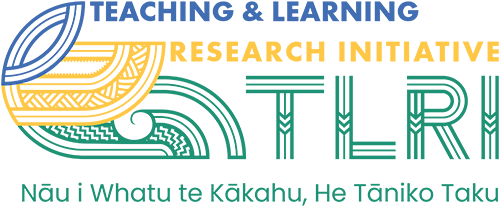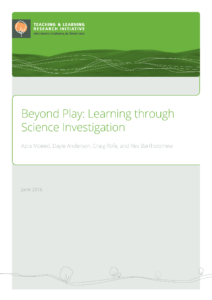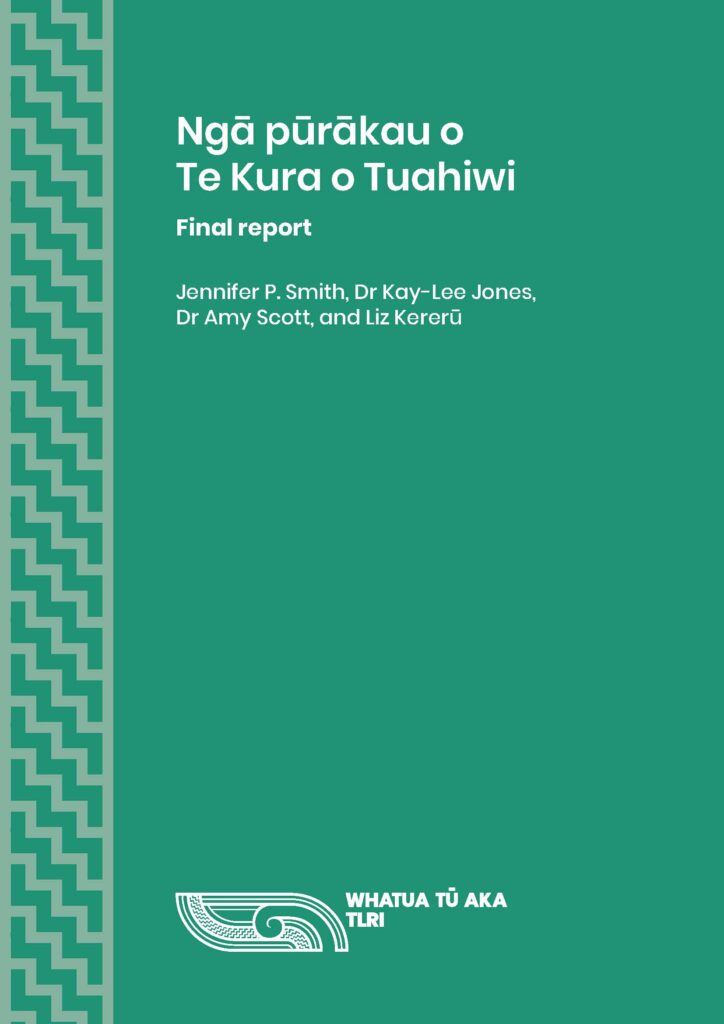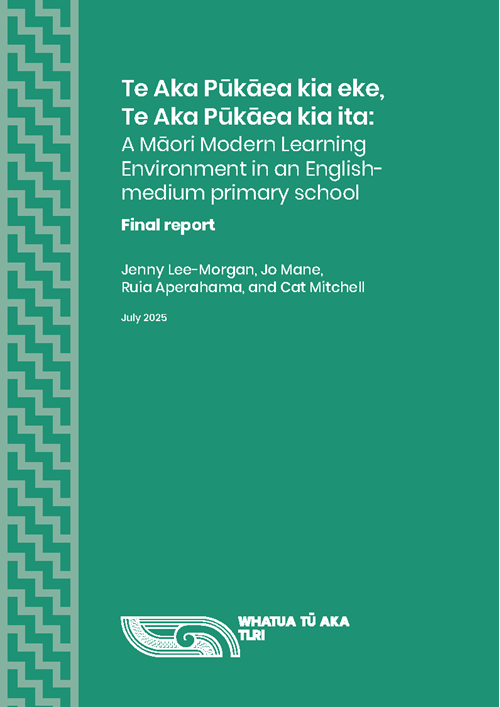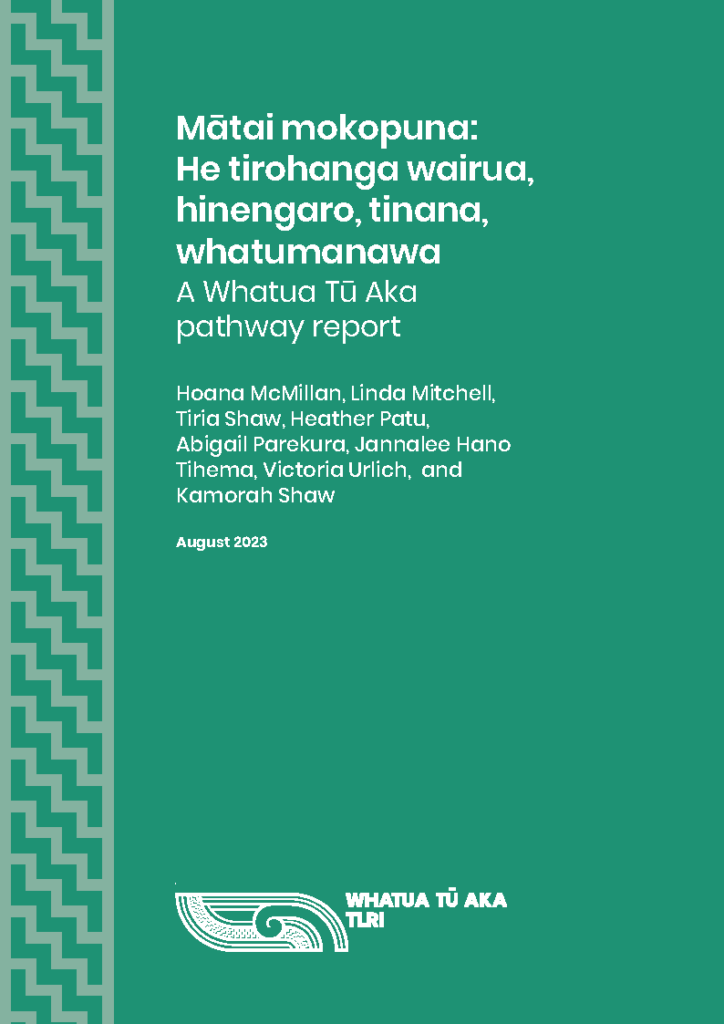Acknowledgements
We would like to thank the Teaching and Learning Research Initiative for providing the funding for this project and Dr Rose Hipkins for her support as our monitor. We are grateful for the guidance from Professor Robin Millar who gave us his thoughts, time, and the confidence to take on this project. Our sincere thanks to the schools, teachers, and students without whom this research would not have had much to say. Kia ora tatou.
Aims and background
The science learning area of the New Zealand Curriculum (NZC) (Ministry of Education, 2007) requires students to learn about “features of scientific knowledge and the processes by which it is developed” and “carry out science investigations using a variety of approaches.” Millar (2011) describes an investigation as:
an activity requiring identification of a question, using both conceptual and procedural knowledge in planning and carrying out the investigation, gathering, processing, and interpreting data and drawing conclusions based on evidence. Ideally, the process is iterative and the student has some choice in what they want to investigate. (p. 2)
Investigations are mostly, but not always, practical in nature (Gott & Duggan, 1996). A science investigation is just one form of practical work and contrasts with a “recipe following” practical activity in which students simply have to follow a set of written or oral instructions.
Evidence suggests that New Zealand students’ experience of science investigations is limited (Anderson, 2012; Hipkins et al., 2002; Hume & Coll, 2008; Moeed, 2015). While students undertake some practical science investigation in schools, there is little evidence that they learn much by doing it (Hume & Coll, 2008; Moeed, 2015). Students tend to see practical work as fun but disconnected from their science learning (Anderson, 2012). We wanted to examine what New Zealand students are learning from science investigation.
The NZC (Ministry of Education, 2007) aims to promote understanding of the knowledge produced by science (substantive understanding) together with an understanding of the means by which it is generated and accepted; that is, the nature of science (epistemological understanding). The Nature of Science strand is the overarching strand of the science curriculum, comprising four sub-strands:
- understanding about science
- investigating in science
- communicating in science
- participating and contributing.
This project focused on the first two sub-strands. Endeavouring to make the complex task of interpreting the New Zealand science curriculum more explicit, Bull (2012) argues that students need to develop functional epistemological knowledge; they should learn to use their knowledge, whether they are destined for work in science-related careers or as citizens. She proposes, in response to the NZC objectives, that students develop the following Science Capabilities for Citizenship:
- gather and interpret data
- use evidence to support ideas
- critique evidence
- make sense of representations about science ideas
- engage with science.
These capabilities are more than skills, and align with the key competencies in the NZC. The first three capabilities relate directly to investigating in science and were used as a framework in data analysis for this project.
International research indicates that to implement an investigative approach, teachers need a sound understanding of the investigative process (National Research Council, 2000). Little empirical research focuses on teachers’ knowledge of science investigation (Davies, Petish, & Smithey, 2006) and “there is little knowledge of teachers’ views about the goals and purposes of inquiry, the process by which they carry it out, or their motivation for undertaking a more complex and difficult to manage form of instruction” (Keys & Bryan, 2001, p. 636). In the United Kingdom, Watson, Goldsworthy, and Wood-Robinson (2000) found that the national curricula have an overly heavy emphasis on fair testing and that this is detrimental to other types of investigation such as “classifying, identifying, pattern seeking, exploring, investigating and making things and developing systems” (p. 85). These types of investigations are listed as approaches to investigation in the aims of the New Zealand science curriculum.
School science investigation is a pedagogical approach that can have both substantive and epistemological goals (Hodson, 2014; Millar, 2011; Osborne, 2014). Hodson (2014) argues that successful pedagogy in relation to science investigation depends on teachers having a clear purpose for any investigation task they use in class, and planning carefully to enable it to be realised:
First, clarity about learning goals is crucial to judicious selection of teaching and learning methods. Second, teachers need to be a little more circumspect and modest in their aspirations for a particular lesson. (p. 2537)
Millar (2010, 2011) agrees and warns that expecting students to learn a science idea by engaging in one learning experience is unrealistic.
In summary, we chiefly wanted to explore how investigative work was implemented in New Zealand, and how its use might be improved to enable it to achieve more effectively the learning goals of the NZC (Ministry of Education, 2007).
Methodology
We first investigated the perceptions of both teachers and students of the educational role of science investigation and its features in school contexts. These data provided the basis for focused reflection, involving teachers, researchers, and an international advisor on current practice, on how this practice might be modified to more effectively achieve agreed learning goals. Teachers then planned and implemented actions that emerged from this reflection. The effectiveness of these actions in promoting science learning congruent with curriculum intentions was evaluated.
To develop an in-depth understanding of the complexity of teaching and learning science investigation in a range of New Zealand school contexts, we conducted a set of case studies. Case studies allow detailed description of multiple perspectives (Merriam, 1998; Patton, 2002; Stake, 1995).
Our collaborators and participants for the 2 years of research were:
- Two primary schools, a junior (JP) and middle primary (MP) teacher and their classes.
- One middle school, an intermediate teacher (IT) and a secondary school teacher (ST) and their classes.
- One wharekura, two teachers (W1 & W2) and their classes.
- One secondary school, three secondary science teachers (T1, T2, & T3), and their classes.
As shown in Figure 1, the research was conducted in two phases. Phase 1 collected data about current practice which could then be used to inform teachers’ decisions about aspects of practice that they wished to improve in Phase 2. An additional “pre-phase” was developed for the wharekura in which science investigation was modelled with teachers and students before Phase 1 started. The wharekura case study section provides further detail. Table 1 presents the research questions and data sources.
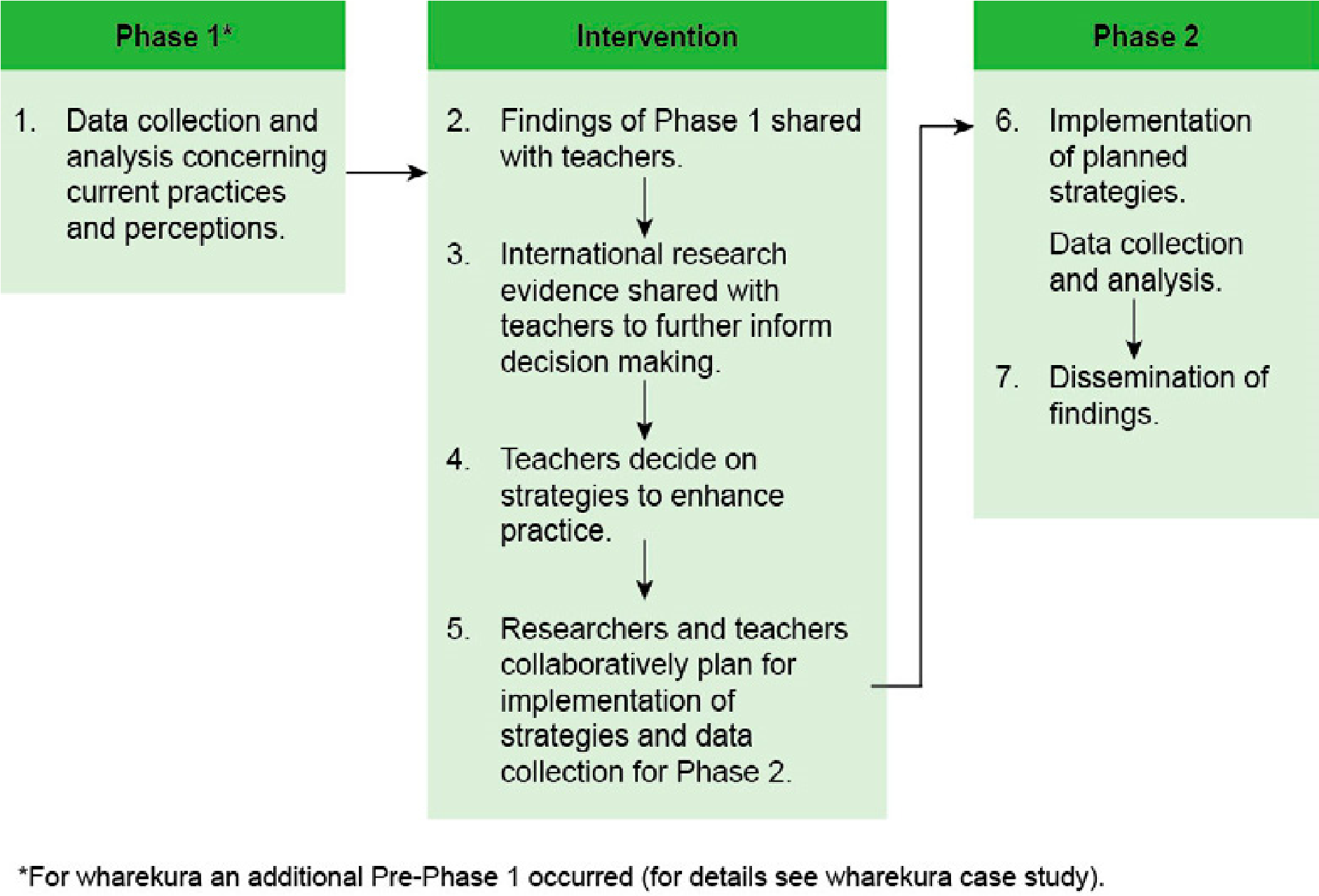
| Phase 1 | |
| RQ1
How do participating teachers conceptualise science investigation, and its educational role within school science? |
Data sources:
|
| RQ2
How do participating students conceptualise science investigation, and its role within school science? |
|
| Phase 2 | |
| RQ 3: What practices support students’ substantive and epistemological learning through investigation? | • Data sources as above during intervention. |
Data collection methods differed slightly between the schools and are described in each case study.
Following Phase 1, the data were analysed and shared with the teachers at a meeting. It was common across all sectors for teachers to emphasise the importance of making observations when investigating and to highlight practices that aligned with the direction of the NZC. The teachers were provided with a paper by Millar (2010) about analysing practical activities to assess and improve their effectiveness. They attended a research presentation that proposed the effectiveness of having fewer goals for a practical activity and sharing the goals explicitly with the students. After the summer break, teachers met with their researcher, and the teachers decided on intended changes. Researchers assisted with implementation; for instance, by providing supporting literature.
The four researchers collected Phase 2 data and collaboratively coded the observation schedules, teacher interviews, and student focus group interviews inductively. The Science Capabilities for Citizenship (http:// scienceonline.tki.org.nz/Science-capabilities-for-citizenship/Introducing-five-science-capabilities) were used deductively to analyse focus group interviews, questionnaires, and observations. In each case, accuracy and common understanding were required for consistency in allocating the codes. A constant comparison process (Merriam, 1998) was used in open coding of phrases and words used by participants.
We first report the four case studies (primary, middle school, secondary school and wharekura) and follow this with a discussion to answer the research questions.
Science investigation in primary school
The primary school case study was carried out with two teachers in separate schools. The teachers were selected because they were known to be teaching science on a regular basis, and worked at different stages of the primary sector (Table 2). Both teachers had participated in 2010 in the Primary Science Teacher Fellowship scheme, now revised as the Science Teaching Leadership Programme (www.royalsociety.org.nz/teachinglearning/science-teaching-leadership-programme) administered by the Royal Society of New Zealand, and so had an interest in teaching science.
| Teacher | Teacher background | Class | Phase 1 Topic | Phase 2 Topic |
| JP | Female, trained primary teacher, 15 years’ experience, 5 years at Yr 0–1.
Teacher in charge of science. |
Yr 0–1 | Bubbles | Magnets |
| MP | Female, trained primary teacher, 24 years’ experience, 8 years at Yr 5–6.
Teacher in charge of science. |
Yr 5–6 | Fizzing and foaming: chemical reactions |
Heat and insulation |
Phase 1
Both teachers were interviewed about their beliefs about the nature and purpose of school science investigation. Three lessons that included a science investigation were observed in each class. Individual students in the Year 0–1 class were interviewed during or following the lessons. A focus group from the Year 5–6 class was interviewed after two of the three lessons and all students completed a questionnaire to explore their perceptions of learning.
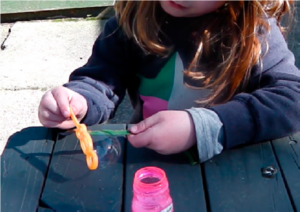
Both teachers believed science investigation involved a high degree of student ownership and participation. The teachers differentiated investigation from play: “You can imagine mixing oil and water and stuff—the kid who does it and really looks to see what happens, and the kid that just wants to stir it all up and keep slopping things and playing … they need to think about what they’re trying to find out to make it an investigation” (MP). In both classrooms exploration was the most common form of investigation, encouraged and supported by teachers. Children at both levels were observed to move between play and were more focused on personal exploration, such as whether a bubble could be caught on a leaf.
Both teachers believed one purpose of science investigation was developing substantive ideas and both were observed to use investigations for this purpose. MP supported her students to learn about the features of chemical reactions through a highly structured sequence of investigation and observation. JP supported students to understand what happened when bubbles burst through observation, use of a balloon model, and reading a non-fiction text.
Developing substantive ideas was combined in the observed lessons with another major purpose for science investigation identified by both teachers—that of learning about the nature of science. Both encouraged their students to look carefully, the way a scientist would. MP exhorted students to persevere: “Scientists don’t just have a quick look and walk away”. Supporting students to develop observation skills was an important goal for both teachers. JP purposefully developed her students’ wonderings and questions about bubbles into class investigations. She helped them make observations and use them to answer their questions, providing opportunity for students to develop the science capabilities of gathering and interpreting data and using evidence. MP also felt observing carefully was an important goal for older primary school students, together with learning to question and be critical, and to apply this learning to wider issues, although the latter were not a focus in the observed lessons.
Year 0–1 students described what they had observed individually about bubbles; they did not recognise their activity as science. Year 5–6 students recognised that science involved careful observation, including using all the senses and that learning this was MP’s intention. They generalised that some reactions might take longer than others. There was also a perception that MP’s intention was that they should enjoy science and view it positively. They were uncertain about why scientists had to make careful observations, suggesting it was so other scientists did not have to do the investigations for themselves.
Teacher-selected interventions
Following the presentations and having spent time with the readings provided, including one about the “big ideas” of science education (Harlen, 2010), JP had felt that she wanted students to know why they were learning about a science topic and see its application. She planned a topic on magnets because of its potential for application; the children could easily recognise magnetic properties and their use. She interviewed each child before and after the unit to find out what they knew about magnets, their use, and why they should know about them. MP said she wanted to work more with students’ ideas and therefore wanted to promote more student discussion. The researcher supplied a research article on promoting student talk (Chapin & O’Connor, 2007), and together they planned a unit on heat and insulation that involved students working in groups designing an investigation.
Phase 2
JP provided a range of exploration experiences that enabled children to examine the properties of magnets. She also provided opportunities for students to see how people within the school community used magnets in their work. The science unit was followed by a technology task in which students designed a magnetic holder for their spelling homework cards.
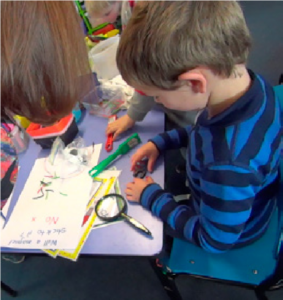
Although most students knew at the start of the unit that magnets stick to metals, all students knew this by the end, and many (11/17) recognised that not all metals were attracted to magnets. A few identified that magnets could repel each other, and some also were developing ideas about magnetism as an invisible force that can act at a distance: “It can go through stuff”; “It sticks to metal with a field you can’t see”; and it “goes through things without even touching them”. All students could identify uses and applications for magnets and JP reported later that they were using their knowledge of magnets purposefully; for example, to secure items to the whiteboard, and to create hooks for lost swimming goggles. The purposes children saw for learning about magnets included “to know things”, “to teach others”, and to “how to use them”; purposes seen did not change following the intervention. Post-intervention, JP’s reflections about school science investigation focused more strongly on addressing a substantive idea while maintaining the need to “experience the ‘how’ of science”, and supporting students to see the relevance of their learning.
MP implemented a unit on heat transfer that involved students working in groups to design and test an environment that would minimise heat transfer. A comparison of the classroom discourse between Phase 1 and Phase 2 showed that while long periods of teacher talk at the start of the lesson were maintained, there was a large increase in time spent in class discussion throughout each lesson in Phase 2. The nature of class discussion changed from a pattern of teacher question and student response to one where time was given to group or pair talk and student ideas were asked for and built on. The “talk moves” (Chapin & O’Connor, 2007) were used extensively during these periods to elicit students’ ideas and support them to consider other’s ideas about investigation design and heat. There was a high expectation that all would contribute, not just those with their hands up, which had been common in Phase 1. In her post-intervention reflection, MP indicated that she valued this purposeful use of student talk: “Now I will try to record the students’ responses and observations more and refer back to them … it was a science community figuring out things together. I want to keep working on that approach.”
Science investigation in middle school
The middle school was a co-educational integrated Catholic school for Years 7 to 13. The school had a roll of more than 350 students and comprised mostly students who identified as Māori or Pasifika. A large number of refugee students also attended the school.
| Teacher | Teacher background |
| Intermediate teacher (IT) | Male, has an honours degree in media studies and a graduate diploma in teaching (Primary).
Teaching experience, 6 years. Teacher in charge of science in primary school. |
| Secondary teacher (ST) | Male, has three degrees, trained primary teacher.
Teaching experience over 10 years in secondary school, HOD Science. In the second year he moved to another school and was unable to carry on with this research project. |
Phase 1
One intermediate and one secondary teacher volunteered to participate in the research project. During the initial interview both acknowledged the motivational significance of investigations but said it was not the main purpose of investigation. In their view, ideally, the teachers’ role in students’ investigation was that of a facilitator (IT). They emphasised the value of hands-on activities to increase student connection to both the substantive and procedural concepts. For example, “It is good to see their thoughts developing when they are doing those investigations” (ST).
Three lessons were observed in each teacher’s class and each was followed by a focus group interview. In the first of the three lessons in IT’s class, students were given musical instruments and the teacher’s intention was for students to work out that vibration created in musical instruments produce sound and that there is variation in pitch. IT provided the opportunity for exploration, but when the first investigation on exploring sounds became unmanageable in the confined space, he set a task for students to design an instrument, in their own time doing research about their instrument, and then sharing their research findings with the rest of the class. In the third observed lesson, students were to classify some household chemicals into acids and bases using litmus paper as an indicator. The lesson was structured, and students followed instructions sequentially to successfully complete the activity. The discussion at the end of the lesson was led by the teacher and students contributed their answers to the questions.
In ST’s class, student engagement with practical work was a priority, which was in line with his belief that science investigations are at the heart of science learning, indicating an understanding of the empirical nature of investigation. He thought that “students should be planning investigations” but this was less evident in practice. ST engaged his students in “recipe style” investigations, mainly exploration and classification, where students followed the instructions demonstrated to them to learn an idea the teacher wanted them to understand. ST explained in some detail how he asked his class to sort and classify chemicals, make observations and explain these. He introduced techniques through teacher-directed activities, and then moved toward student-led group investigations using those techniques; for example, learning to measure voltages and using that knowledge to look for patterns in parallel and series components.
Overall, both teachers believed that school science investigations were like the investigations carried out by scientists. They saw the purposes of science investigation as confirming science concepts, developing student familiarity with laboratory equipment and safety, preparing for the science fair, and encouraging students to think. They believed their students lacked previous experience with practical work and considered it important to provide these learning experiences to the students. In practice, investigations were teacher-led in both classes, with more opportunity to explore being provided in the Year 8 class. Both provided opportunities for students to have hands-on engagement and most students followed instructions and did what the teacher intended them to do. However, in focus group interviews it was not clear that students were learning what the teacher intended them to learn. Students were manipulating objects but the practical work did not lead to thinking about the related science ideas.
Teacher-selected intervention
Both teachers attended the meetings and were given readings as described in the methodology. They were familiar with the need to prioritise teaching about the nature of science and decided to focus on teaching it through the science capabilities. ST also wanted to continue to select investigations that would help students develop science ideas “they could use later”, and so “they could link the theory with the practical”. IT was provided with guidance and support with planning the unit of work following the first lesson observed. ST moved to another school soon after the intervention was agreed upon and as the context and the participants were different, no further data were collected from him.
Phase 2
In Phase 2, the focus for the investigation for both classes was on investigating forces. The topic was forces and motion and the students worked towards planning and carrying out an investigation. IT provided each student with detailed formative feedback on their assessment indicating how they could improve their investigations.
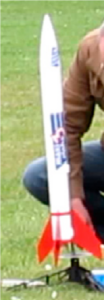 In IT’s class, the observed lessons were closely related, and about forces. Students planned, made, and tested rockets, and the assessment encouraged them to think critically about how they could improve their rockets.
In IT’s class, the observed lessons were closely related, and about forces. Students planned, made, and tested rockets, and the assessment encouraged them to think critically about how they could improve their rockets.
At the end of the three lessons on rockets students were asked to complete a questionnaire. In response to the question about what they had learnt, almost all answers were substantive ideas; for example, identifying forces acting on the rocket, talking about thrust, and balanced and unbalanced forces. When asked what they did that was similar to what scientists do, the students said they wrote a report (n = 2), experimented (n = 4), launched rockets (n = 4), and tested their rockets (n = 2). Students were able to list observations but were generally unable to identify inferences.
In comparison with Phase 1, IT’s planning was more focussed, with clear learning goals for each practical task. Students participated in the activities enthusiastically but evidence from interviews and questionnaires suggests that although the intention was for students to learn about the nature of science, students did not identify this learning, but rather identified mostly substantive ideas.
Science investigation in secondary school
The secondary case study school was a co-educational secondary school of approximately 1,100 students in a large New Zealand city. The school had high expectations of student achievement, and aspired to develop resilient learners, who were passionate about making the world a better place.
| Teacher | Teacher background |
| Teacher 1 (T1) | Female, has a science degree, trained as a science and biology teacher.
Teaching experience, 33 years. |
| Teacher 2 (T2) | Male, has three degrees, trained primary teacher. Teaching experience 5 years in secondary school. |
| Teacher 3(T3) | Female, has a degree in Biomedical science, and a graduate diploma in teaching.
Teaching experience 4 years in secondary school. |
Although not purposefully selected for experience, it is fair to say that all three are capable science teachers.
Phase 1
We started Phase 1 data collection by interviewing the three teachers to gain an insight into their beliefs about science teaching and learning; the purpose of school science investigation as a pedagogical approach; and their views about the nature of science. This was followed by observations of three lessons in each teacher’s Year 9 class and a focus group interview to find out what students thought they learnt by investigating in each class. All students in the three classes also completed a questionnaire. The teaching and learning context for all classes was water.
There was synergy between teacher beliefs and their practice. For example, T1 believed that the purpose of science education was to make sure that students’ see the relevance of science in their daily lives. Conceptual understanding, learning that there is a variety of ways to investigate, and to understand what fair testing involves, were important aspects of learning science for her. T2 emphasised “inquiry into the modern and the natural world; students need to understand their world and how it works.” He believed in teaching students a framework so they know how to go about an investigation, but then give them opportunities so they learn to think critically: “How can I apply the science I have learnt? Is there a pattern that I can see in this data? What other ways might there be to do this investigation?” He said that when his students saw the same investigation done by another group differently, it gave them the “opportunity to critique their own and others’ design”. This was evident in his practice. T2 encouraged students to plan and carry out investigations and there was always opportunity to reflect upon the associated science ideas. T3 said she created possibilities for students to be curious and ask questions. Her focus was on engaging students and getting them interested, not just in the science that they were doing in class, but the science they came across in their lives. For students to do science and think about science critically, “the science teacher needs to connect with the student’s world, and provide experiences”. For example, “Look at what is being said, who is saying it? What might be the possible reasons for making particular claims?”
Following the mandated curriculum policy, the science department was focusing on the Nature of Science strand of the curriculum. As a department they were wanting to use the Science Capabilities for Citizenship concepts to support their students to develop a functional understanding of the nature of science. The teachers wanted students to be actively involved, have “fiddle time”, and learn together, generating ideas to investigate. Although they had different pedagogical approaches, all three believed that students needed skills to plan an investigation, control variables, measure accurately, and to come to evidence-based conclusions. T2, for example, commonly used a guided discovery approach to school science investigation, whereas T3 asserted that not all science lessons have to be practical, and that she selects practical experiences based on what she “wants her students to learn”. All nine lessons observed in the three teachers’ classes began with an activity to link to the previous lesson; learning intentions were shared. Each lesson ended with reflection time. In this phase, multiple expected outcomes were observed for each lesson, including both contextual and nature of science objectives from the curriculum.
Analysis of the focus group interviews shows that the students were able to identify the substantive ideas they were learning, and observations showed proficiency in following procedures. There were 53 (n = 85) capability-related responses; most were to do with gathering and interpreting evidence (n = 35), mainly making observations and inferences. Students experienced a range of approaches to investigation, including identifying and classifying, pattern seeking, fair testing, and using models.
Teacher-selected intervention
The teachers were presented with a graph showing science capability-related responses from Phase 1. They decided to teach students how to plan and carry out a fair testing type of investigation while continuing their focus of developing science capabilities. They wanted to extend beyond the first capability of gathering and interpreting evidence, the focus in Phase 1. The context was rates of chemical reactions. Teachers planned collaboratively, as was the practice in the science department and shared the plan with the researcher. The teachers and researcher decided to use Abrahams and Millar’s framework for evaluating the effectiveness of practical tasks (2008, p. 1947).
Phase 2
In this phase, three lessons were observed in each class; in these lessons, the focus was on aspects of investigation. What was to be learnt in each lesson was clearly thought through by the teachers. There was one clear learning intention for each lesson. Although the teachers shared learning intentions in different ways, there was a focus on epistemological understanding in each lesson. Following their different styles, T1 took the students through the process of designing and carrying out a fair testing “experiment”. This led to students planning their own investigations, gathering data, processing it, critiquing the evidence, and dealing with “outliers” in the data. T2 did a number of practical activities, each with a particular focus. For example, in the first lesson, students explored what would happen if they put mentos lollies in fizzy drinks. A measuring tape was set up outside the building and students were allowed to put in a number of mentos and measure the height of the resultant geyser. It was windy and along with the set ruler students could use a time delay camera to record their measurements. The lesson finished with going back to the class and reflecting on the “accuracy of their measurements, and what they had recorded” (T2). They critiqued this in groups and designed a plan for repeating the investigation, identifying which variables to control and the best way of measuring and recording. The next two lessons followed a similar style with evidence of students’ planning, thinking critically about their design, doing the investigation, and critiquing their evidence, with the lesson ending with the class discussing ways of improving the reliability of their findings. In T3’s class, students did a similar investigation with mentos and fizzy drinks but they talked about their plan, and how they could collect their evidence so that it was robust before going outside to try it out. The lesson ended with students sharing how they had collected the evidence and why they thought their findings were reliable and why not. All three teachers moved around the classroom, asking questions and gaining an insight into the students’ understanding at an individual level. Student ideas were used in reflections at the end of the activity.
Transcripts of class discussion from both phases were analysed using the capabilities. There was an increase in student responses about using and critiquing evidence, and interpreting representations. Numbers of comments pertaining to observation and inference increased. It seems that students continued to associate observations and inferences with science, even though it was no longer the teaching focus (see Figure 2).
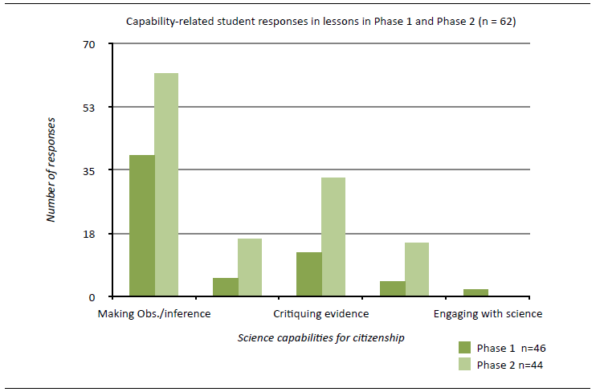
Questionnaire and focus group data analysis shows that in all three classes, students learnt to plan an investigation, gather, process and interpret data, and critique both evidence and the plan. The analysis also showed that although students had developed considerable capability with regard to planning and critiquing investigations, and could identify a range of practices as scientific, when asked about what they had learnt, their answers were mostly about substantive ideas related to chemical reactions, suggesting that they saw substantive learning as the end goal.
Science investigation in wharekura
Wharekura are places of learning for Māori that embody the physical, spiritual, mental, and emotional teaching and learning of all participants. Modern day wharekura are co-educational immersion secondary schools (kura) where the philosophy and practice reflect Māori cultural values, the aim being to revitalise Māori language, knowledge, and culture (Smith, 2000). In the participating wharekura, the students’ holistic development as Māori had primacy; science teaching accommodated this philosophy. Doing research with kura required an understanding of the unstated but understood ethical care that mana whenua and mana tangata are preserved. To collaborate with wharekura, having mana and a knowledge of how to engage with wharekura are significant. The success of this research was dependent on the trust students placed in a broker, in this case one of the researchers. In addition to the broker’s role, developing a relationship of care and support through home visits, being available when required, the notion of awhi mai, awhi atu (mutual support), gave the teachers confidence to take leadership in teaching science investigation.
We collaborated with the principal and two teachers—W1 and W2—and their classes. Initially, the wharekura did not have a science programme as it was difficult to employ teachers who could teach science in te reo Māori. Consequently, the students with whom we worked had no formal science teaching, which meant that we altered our research design. Whereas in the other participating schools we collected baseline data in the first year, in the kura our collaborators were keen to have professional development to enable them to teach science. Our model was for the teachers and students to learn science together in the first year (pre-phase), which involved a total of 10 2-hour sessions of science teaching and learning facilitated by the researchers. After the initial session, the teachers said they felt confident to start teaching 2 hours a week of pūtaiao (Māori science) using some of the pedagogies that had been modelled. In the second year of the project, teachers followed Phase 1 and Phase 2 as in the other cases.
The research design allowed both the researchers and participants the space for a bicultural framework. Although there are many examples of bicultural research in the mainstream system, this project was centred on te ao Māori by locating the project at the wharekura. The researchers were in the kura learning from the teachers’ ideas about pūtaiao and the teachers were learning science and approaches to western science and investigation. One thought often expressed by W1 was that she felt the philosophy and practices of the kura were genuinely respected: “You want for our kids what we want for them,” more specifically, making it possible for the students to walk in both worlds—“theirs” and “the other.”
Phase 1
The teachers quickly adjusted to teaching science using an investigative approach. They used a collaborative model to construct how to undertake a fair testing type of science investigation. They found frameworks for fair testing commonly used in textbooks useful. Students were able to plan and carry out an investigation, developing a hypothesis, making measurements, and interpreting and analysing data. Most students were able to draw evidence-based conclusions from the data they collected. Most students could explain a fair testing type of investigation, although they tended to view investigation as a linear rather than an iterative process. Although students were developing their understanding of the fair testing process and had experienced other approaches to investigation such as exploration, classifying and sorting, pattern seeking, and making and using models, they did not consider these to be investigation.
The teachers themselves were learning substantive science ideas alongside the students. Digital technology was a strong focus in the wharekura and teachers used it to access science knowledge with ease. They encouraged students to find out content using the many online resources available.
Both teachers had an added complexity to negotiate because their students needed to accommodate western ways of making sense of their world that did not conflict with their culture and identity as Māori. Both teachers appeared capable of creating an environment in which students felt their identity and views about their world and how it works were valued.
Wharekura students unpacked and reflected on the nature of science best by working as a group, preferring to approach the science ideas and investigation questions together. They were more comfortable with teacher-led investigations and were initially reluctant to explore freely. Both teachers’ and students’ preferred pedagogical approach was being shown how to do something. W1 illustrated this pedagogy: “A kaumatua (elder) had gone eeling and he took them through the whole process of preparing the eel from beginning to the end, which is science,” implying that having the process modelled was an acceptable approach for learning science (Rofe, Moeed, Anderson, & Bartholomew, 2015). Trinick & Dale (2015) similarly argue that “ako a kaka” or rote learning is an accepted methodology in Māori culture and suggest that this is done for the sake of precision and accuracy.
The teacher and students appeared to enjoy and engage in learning how to plan an investigation collaboratively. They actively contributed ideas to the group, where they critiqued the process and agreed on a plan to follow. The process of learning together is presented in Figure 3 where the initial idea was presented by the teacher, and students researched the topic using their electronic devices. Discourse ensued between teacher and students which led to refined ideas. Finally, these ideas were agreed upon and added to the mind map. The major shift was that later in the study, both the teachers and students were confident to play, explore, plan, carry out an investigation, and reflect on the results (see Figure 3).
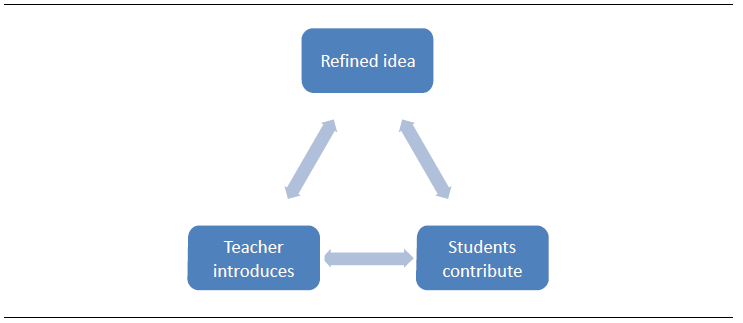
The following structure was developed by W1 using the above model. It appears that at this point, investigation was understood as a linear process: aim, method, results, conclusion, and discussion (see Figure 4).
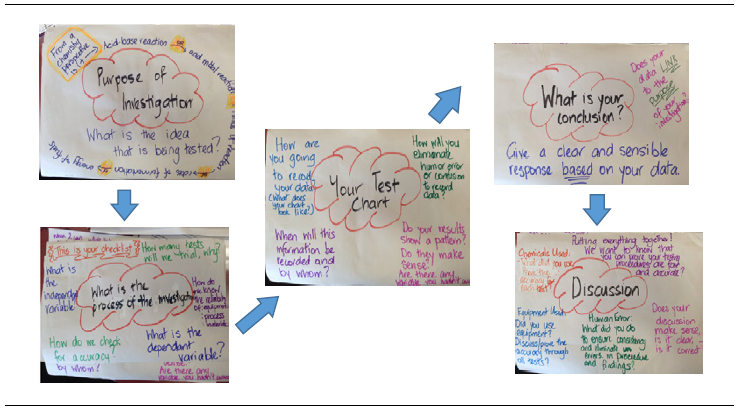
They continued to plan and carry out investigations, actively critiquing each other’s plans and results and were cognisant of the need for evidence to back their claims, asking “How do you know?” “What data did you collect?” and telling another group, “You should repeat it to make sure you are right”. The critiquing process was supportive and there was much use of humour. In kura, students treat each other as a family and are able to work together and laugh with and at each other. The kura environment provided an ideal opportunity for students to be critical and creative in their investigative work.
Intervention
After reviewing the findings of Phase 1 and discussion with the researchers, the teachers collaboratively decided that the focus of their intervention would be to try a variety of approaches to investigation other than fair testing which had been W1’s in Phase 1. W2 also wanted her students to get involved in the bush builders’ project organised by the zoo. Briefly, the bush builders’ project would involve students investigating which animals and plants could live in a specified area of their school grounds. The students would establish an appropriate habitat and encourage or restore the biodiversity.
Phase 2
In W1’s class, students experienced investigations where they explored, classified, looked for patterns and built models. An example of making models illustrates how the students drew upon their cultural knowledge to create a building using their knowledge of pataka (food store house), and weaving flax. The approach to investigation continued to be a collaboration between students and teacher. There was evidence of unit plans of work which included investigations.
Classification and pattern seeking were a focus W2’s lessons; for example, using animals and plants and their characteristics. She introduced the science kupu (Māori words) to organs systems. The preferred pedagogical approach was for students to share their work and ideas. The Nature of Science sub-strands of communicating science and sharing ideas were both in the planning and implementation in class. Communicating and sharing ideas were a common practice in the school.
 The familiarity with their context and in particular their whakapapa was evident during the unit on genetics where students engaged with science ideas and demonstrated a unique insight into family traits. Students were creative in the manner in which they personalised genetic knowledge, connecting not just traits but Māori concepts that were important to the students. For example, along with mutants, eye colour, they included ancestors and whakapapa. Their drawings of DNA included roots and leaves suggesting both being grounded in the past and growing in future. As participants in the bush builders’ project, W2’s class investigated the biotic and abiotic needs of the animals and were supported to create a suitable environment for native animals and plants to be introduced to the school the ngahere (forest). Additionally, W2 incorporated a Māori world view of kaitiakitanga (guardianship) between humans and animals. Her approach went beyond biology learning to include values such as the responsibility of caring for others, including animals. She purposefully chose examples of animals that had a cultural significance for Māori; for example, hoiho (penguins) and kunekune (pigs). Sharing kai is cultural practice and was not discouraged just because students were learning science.
The familiarity with their context and in particular their whakapapa was evident during the unit on genetics where students engaged with science ideas and demonstrated a unique insight into family traits. Students were creative in the manner in which they personalised genetic knowledge, connecting not just traits but Māori concepts that were important to the students. For example, along with mutants, eye colour, they included ancestors and whakapapa. Their drawings of DNA included roots and leaves suggesting both being grounded in the past and growing in future. As participants in the bush builders’ project, W2’s class investigated the biotic and abiotic needs of the animals and were supported to create a suitable environment for native animals and plants to be introduced to the school the ngahere (forest). Additionally, W2 incorporated a Māori world view of kaitiakitanga (guardianship) between humans and animals. Her approach went beyond biology learning to include values such as the responsibility of caring for others, including animals. She purposefully chose examples of animals that had a cultural significance for Māori; for example, hoiho (penguins) and kunekune (pigs). Sharing kai is cultural practice and was not discouraged just because students were learning science.
Although wharekura teachers did not have any formal science qualifications, they had pedagogical knowledge, knowledge of the students as Māori, and the philosophy of the kura; therefore, with the willingness to teach science they were able to engage the students in learning science. Teachers reported having gained confidence in teaching science and attributed this to the “genuine interest” they felt the researchers had in their and the students’ success. Lack of confidence is often reported as a barrier to science teaching by primary teachers (Anderson & Moeed, 2013). Two non-science specialist teachers were enabled to introduce and develop science programmes in Years 1 to 10.
Cross-case analysis and discussion
In considering the changes that teachers made to their practice and their effects, we found it useful to draw on Millar’s (2004) model of practical work (Figure 5). Millar argues that practical work links the two domains of objects and ideas. Simply doing investigation is unlikely to enable students to make sense of either substantive or epistemological ideas. The teacher’s role is critical in linking the domains of objects and ideas. Students need the opportunity to discuss, argue and reason to make sense of observations, as well as make nature of science ideas explicit.
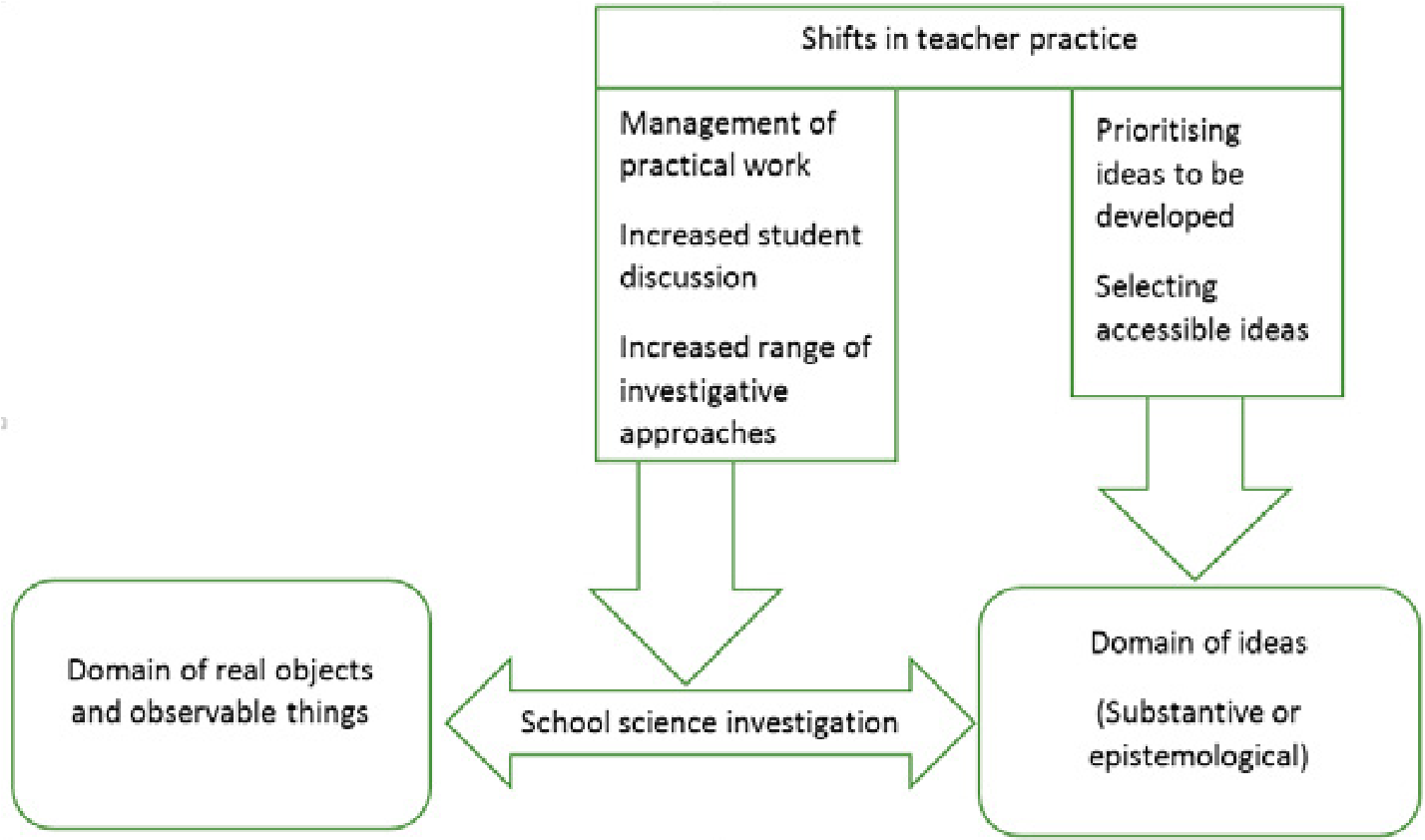
From the beginning, teachers all saw science investigation as motivating and purposeful, providing opportunity to develop students’ substantive and epistemological understanding. The changes they made were in prioritising or selecting the ideas to be learned from a particular investigation, or ways in which they engaged students with those ideas. Having a specific and clear focus on intended learning for an investigation was a shift for most teachers. For some, the shift was in the organisation and management of the investigation and the encompassing discussion to better connect students with focus ideas. These shifts appear, in most cases, to have resulted from the time provided to thoughtfully consider their own practice in the light of research literature. The hui following Phase 1 highlighted existing effective practices from each case, providing affirmation and selfconfidence. The collaborative nature of the research seemed to be an added factor: researchers were seen as supportive, and teachers joined the project with the desire to learn from one another and across sectors.
The next sections describe and discuss findings for the three research questions that framed the study.
Research Question 1: How do participating teachers conceptualise science investigation, and its educational role, within school science?
All teachers agreed that science investigations were motivating and engaging for students. Engagement and interest are considered indicators of motivation and have an influence on achievement (Wigfield et al., 2015). Loukomies, Juuti, and Lavonen (2015) describe the notion of situational interest; they argue that both catching and holding interest are important. The idea of remembering a spectacular event may well be useful for catching but it is the holding on to the interest that may lead to long-term personal interest. Student-led investigation is promoted as one means of motivation (Abrahams, 2009) and nearly all teachers identified student ownership as characteristic of science investigation. Within each case and across both phases a variety of student-led and teacher-led investigations were observed. The teacher always chose the major context within which students developed investigations, sometimes from their own questions, and sometimes within teacher-set parameters. Teachers all selected investigation contexts that would engage their students but had goals beyond immediate engagement. All saw science investigations as contributing to the development of substantive science ideas and used them for this purpose throughout the study. Two teachers initially appeared to assume that often counterintuitive scientific theories were immediately discoverable through investigation; Driver (1994) calls such a notion the “fallacy of induction” (p. 45). In Phase 2, one of these teacher’s practical investigation was better structured and managed and the other increased student discussion. These changes to practice, but not necessarily belief, provided more opportunity for students to connect their observations with science ideas.
Teachers were aware of the curriculum emphasis on the nature of science and most saw science investigation as an opportunity for students to develop understandings of the nature of science, although this was not so dominant in the middle school. In the primary and secondary cases in Phase 1, lessons were “multi-purpose”; teachers’ intentions were to develop the nature of science ideas alongside substantive ideas. Hodson (2014) and Millar (2010) both suggest that being clear about the purpose of a lesson and deliberately planning to address that goal is more effective practice. While the primary teachers continued their multi-purpose approach in Phase 2, in the secondary school, teachers purposefully reduced the number of goals for each lesson. The following quotation perhaps epitomises their developing understanding of the effective practice:
You don’t just do practical work or investigation, I think about what I want the students to learn, and then decide what might be the most appropriate way for the students to learn that … often it is an experiment, sometimes an investigation where they are looking to confirm a theory we have learnt about, at other times they may be learning the procedure and skills. I might want them to gather evidence or I might present some evidence … graphs, pictures … and want them to critique it.
The effectiveness of this purposeful planning for nature of science learning is discussed in Research Question 3.
 Of the range of approaches to investigation expected by the aims of the NZC (Ministry of Education, 2007), exploration was more common in the early years in both phases, with a progressive trend toward more classification and fair testing further up the education system. We observed only a few instances of opportunities for students to investigate models and no instances of things being made or systems being developed. We observed classrooms at just one point each year so students may have experienced other investigation approaches at other times. Play and exploration appeared to be useful precursors to support students to develop questions and plan investigations. Students were able to plan their investigations when they were more familiar with the context (Hipkins et al., 2002).
Of the range of approaches to investigation expected by the aims of the NZC (Ministry of Education, 2007), exploration was more common in the early years in both phases, with a progressive trend toward more classification and fair testing further up the education system. We observed only a few instances of opportunities for students to investigate models and no instances of things being made or systems being developed. We observed classrooms at just one point each year so students may have experienced other investigation approaches at other times. Play and exploration appeared to be useful precursors to support students to develop questions and plan investigations. Students were able to plan their investigations when they were more familiar with the context (Hipkins et al., 2002).
Research Question 2: How do participating students conceptualise science investigation, and its educational role, within school science?
Students largely identified science investigation with practical activity. Year 5–6 students associated science with doing experiments, although individuals associated a range of activities with science; for example, predicting, exploring, asking questions, thinking, sharing ideas, and checking. Most secondary students saw a science investigation as having a question, writing a plan, doing the “experiment” and collecting data, and then writing up a conclusion based on their results. Most highlighted the need for careful observation and accurate measurement. In Phase 2, along with observation, the secondary and wharekura students talked more about evidence, and “critiquing evidence” and critiquing their plan and each other’s plan. The frequency of their comments closely aligns with what the teachers intended them to learn in each phase.
Figure 6 presents the coded responses from an open-ended questionnaire completed by middle primary
school students and the secondary students in both phases, and wharekura students in Phase 1. Most saw engaging in science investigation as purposeful; very few students identified “having fun” as a purpose. Most primary and secondary school students said they did investigations to further their substantive science knowledge and to explain science ideas. Learning how to do science was a predominant purpose for wharekura students and more common among secondary students in Phase 2. In Phase 2, many secondary students also identified a need for evidence as a purpose for science investigation; the strength of these responses reflects the teachers’ focus.
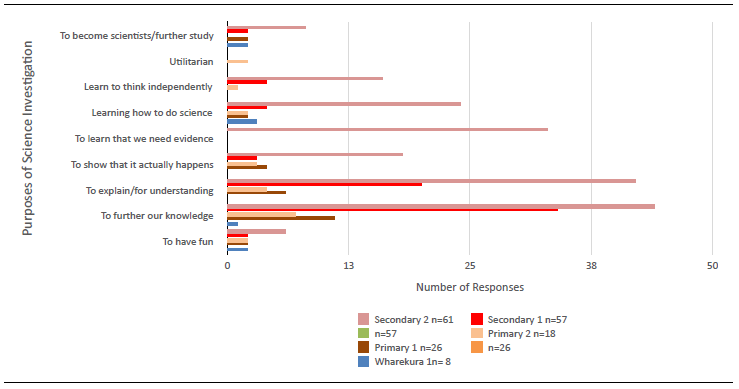
Student emphasis on understanding substantive ideas as a purpose for science investigation substantiates findings from interviews: when asked about their learning, students in all cases identified substantive outcomes, even when student learning about the nature of science was evident.
Research Question 3: What practices support students’ substantive and epistemological learning through investigation
In answering this question, we considered the student learning observed in each classroom and the teacher practices that were prevalent. We also considered the nature of teacher interventions and their effects from Phase 2 of the study. Questionnaires, interviews, and lesson observations provided opportunities to examine student learning of both substantive and epistemological ideas.
An explicit and planned focus on the Nature of Science strand of the curriculum and the science capabilities supported students’ epistemological understanding and capability development. For example, in the secondary school, in Phase 1 each lesson had several learning intentions. In Phase 2, teachers focused their three lessons entirely on teaching investigation, with one particular capability focus for each lesson. Teachers provided time and multiple opportunities for students to engage with the focus capability. Student responses collected at the end of every observed lesson reflected this focus. In wharekura, a collaborative model made the features of investigation explicit for students and supported them to use processes of gathering data and critiquing evidence. Once a particular capability, such as using observations to support inferences, was established, students continued to apply it in future observed lessons.
Similarly, a clear and specific planned focus on the substantive ideas also supported their development in students. However, primary school students more readily developed understanding that could lead towards understanding of important substantive ideas when they were easily observable. It was easier to learn about properties of magnets than it was to consider what made a bubble burst. JP considered the accessibility of ideas for her students in selecting magnets as a context in Phase 2. MP similarly provided a “library of experiences” (Bull, 2012) and made pedagogical changes that would better support her students to engage with the ideas. However, she was unaware of the cognitive demand of the key idea that she wished to develop about energy transfer. Selecting contexts for science learning where productive substantive ideas are more readily observable seems a useful practice for teachers of younger primary school students, but relies on teachers recognising which ideas are useful precursors for key concepts. A related practice that appeared useful in developing substantive concepts was the teacher selection of a range of investigations and equipment that focused students’ observation on key concepts. Equipment and investigations were carefully selected to support specific ideas. Although these teachers could identify such ideas and select related activities, many primary teachers may struggle if they do not have adequate science subject matter knowledge. The Building Science Concepts (http://scienceonline.tki.org.nz) and the Making Better Sense (Ministry of Education, 2001) series provide strong support in this regard, but anecdotal evidence suggests the value of these resources often goes unrecognised, and the resources are becoming scarce in schools.
Conclusion
Most participating teachers understood that learning to investigate was a curriculum requirement within the Nature of Science strand. Learning to investigate was purposeful and students experienced a variety of approaches to investigation.
International research suggests that students, when participating in practical work, do what the teacher intends, but do not learn what the teacher intends them to learn (Abrahams & Millar, 2008). The study showed that when teachers planned for student investigation with fewer but explicit and specific learning goals, the evidence suggested that many students learned what was intended. Teachers’ understanding of curriculum requirements and relevant, accessible, substantive and epistemological ideas enabled them to identify these key goals. Pedagogies that helped students to connect their experiences of science investigation with substantive or epistemological ideas were also crucial.
The common goal of this study was to improve student learning from science investigation. It was this goal which brought together the researchers and teachers and supported them to work together and learn from each other. The project provided time and opportunity for all participants to consider current practice in the light of existing research information. This collaboration enabled research-informed changes in practice and has generated research-based evidence about student learning.
Limitations
This research is a collection of case studies so the findings are not generalisable to the wider population. We worked with only a few teachers in each sector, providing a small window through which to view the teaching and learning of science investigation.
Implications for practice
The study’s implications for practice are that:
- having a clear intention about what and how students are to learn from an investigation supports learning
- learning is more focused when there are fewer intended outcomes for each activity
- planning specifically for development of Science Capabilities for Citizenship appears effective.
Implications for future research
This research involved a set of a four case studies. Further research is needed to verify the effectiveness in other contexts of successful approaches observed in this project. For example, designing practical activities with the purpose of developing understanding of nature of science ideas. Progressions within the development of the science capabilities also need further investigation. The study has provided a small insight into science teaching and learning in one wharekura. We have found that with professional development and support wharekura teachers were able to teach putaiao and western science investigation in one wharekura. However, how students learn science investigation in Māori medium schools needs further exploration.
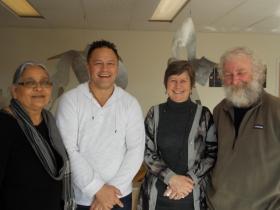
Azra Moeed, Craig Rofe, Dayle Anderson and Rex Bartholomew
References
Abrahams, I. (2009). Does practical work really motivate? A study of the affective value of practical work in secondary school science. International Journal of Science Education, 31(17), 2335–2353. doi.org/10.1080/09500690802342836
Abrahams, I., & Millar, R. (2008). Does practical work really work? A study of the effectiveness of practical work as a teaching and learning method in school science. International Journal of Science Education, 30(14), 1945–1969. doi.org/10.1080/09500690701749305
Anderson, D. (2012). Teacher knowledges, classroom realities: Implementing sociocultural science in New Zealand Year 7 and 8 classrooms (Unpublished doctoral dissertation). Victoria University of Wellington.
Anderson, D. M., & Moeed, A. (2013). Breaking down the barriers to learning science. In A. Fitzgerald (Ed.), Learning and teaching primary science (pp. 19–38). New York: Cambridge University Press.
Bull, A. (2012). Making the most of science learning opportunities in the primary school. Set: Research Information for Teachers, (1), 26.
Chapin, S. H. & O’Connor, C. (2007). Academically productive talk: Supporting students learning in mathematics. In W. G. Martin & M. E. Struthens (Eds.), The learning of mathematics (pp. 113–128). Reston, VA: National Council of Teachers of Mathematics.
Davies, E. A., Petish, D., & Smithey, J. (2006). Challenges new science teachers face. Review of Educational Research, 76(4), 607–651. doi. org/10.3102/00346543076004607
Driver, R. (1994). The fallacy of induction in science teaching (pp. 41–48). In R. Levinson (Ed), Teaching science. London: Routledge
Gott, R., & Duggan, S. (1996). Practical work: Its role in the understanding of evidence in science. International Journal of Science Education, 18(7), 791–806. doi.org/10.1080/0950069960180705
Harlen, W. (Ed.), (2010). Principles and big ideas of science education. Retrieved from http://www.ase.org.uk/resources/big-ideas/
Hipkins, R., Bolstad, R., Baker, R., Jones, A., Barker, M., & Bell, M. (2002). Curriculum, learning and effective pedagogy: A literature review in science education. Wellington: Ministry of Education.
Hodson, D. (2014). Learning science, learning about science, doing science: Different goals demand different learning methods. International Journal of Science Education, 36(15), 2534–2553. doi:10.1080/09500693.2014.899722
Hume, A., & Coll, R. (2008). Student experiences of carrying out a practical science investigation under direction. International Journal of Science Education, 30(9), 1201–1228. doi.org/10.1080/09500690701445052
Keys, C. W., & Bryan, L. A. (2001). Co-constructing inquiry-based science with teachers: Essential research for lasting reform. Journal of Research in Science Teaching, 38(6), 631–645. doi.org/10.1002/tea.1023
Loukomies, A., Juuti, K., & Lavonen, J. (2015). Investigating situational interest in primary science lessons. International Journal of Science Education, 37(18) 1–23. doi.10.1080/09500693.2015.1119909
Merriam, S. B. (1998). Qualitative research and case study applications in education. San Francisco: Jossey-Bass.
Millar, R. (2004). The role of practical work in the teaching and learning of science. Paper presented for the meeting of high school science laboratories: Role and Vision. Washington, DC: National Academy of Sciences.
Millar, R. (2010). Analysing practical science activities to assess and improve their effectiveness. Hatfield: Association for Science Education. Millar, R. (2011). Practical work. In J. Osborne & J. Dillon (Eds.), Good practice in science teaching: What research has to say (2nd ed.). Maidenhead: Open University Press.
Ministry of Education. (2001). Making better sense of the material world. Wellington: Learning Media.
Ministry of Education. (2007). New Zealand curriculum. Wellington: Learning Media.
Moeed, A. (2015). Science investigation: Student views about learning, motivation and assessment. Singapore: Springer.
National Research Council. (2000). Inquiry and the national science education standards. Washington, DC: National Academies Press.
Osborne, J. (2014). Teaching scientific practices: Meeting the challenge of change. Journal of Science Teacher Education, 25(2) 177–196. doi.10.1007/s10972-014-9384-1
Patton, M. Q. (2002). Qualitative evaluation methods (2nd ed.). Thousand Oaks, CA: Sage.
Rofe, C., Moeed, A., Anderson, D., & Bartholomew, R. (2015). Science in an indigenous school: Insight into teacher beliefs about science inquiry and their development as science teachers. The Australian Journal of Indigenous Education, 1–9.
Smith, G. H. (2000). Maori education: Revolution and transformative action. Canadian Journal of Native Education, 24(1), 57.
Stake, R. E. (1995). The art of case study. Thousand Oaks: Sage.
Trinick, R., & Dale, H. (2015). Hinengaro, Manawa me nga e Ringaringa/Head, heart, hand: Embodying Maori language through song. Australian Journal of Music Education, 3, 84–92.
Wigfield, A., Eccles, J. S., Fredricks, J. A., Simpkins, S., Roeser, R. W., & Schiefele, U. (2015). Development of achievement motivation and engagement. Handbook of child psychology and developmental science.3(16), 44
Watson, R., Goldsworthy, A., & Wood-Robinson, V. (2000). Sc1. Beyond the fair test. In J. Sears & P. Sorenson (Eds.), Issues in science teaching (pp. 70–79). London: RoutledgeFalmer.
